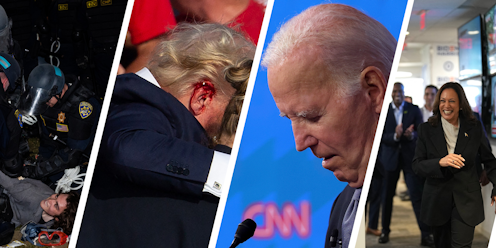Sure, 2024 has had lots of news – but compared with 1940, 1968 or 1973, it’s nothing exceptional
- Written by Philip Klinkner, James S. Sherman Professor of Government, Hamilton College

History usually happens at a leisurely pace, with major events months or even years apart. But this year, it seems like someone has pushed fast-forward, with significant events coming on a weekly or even daily basis. One company is now selling a T-shirt declaring “THIS IS MY LIVING IN UNPRECEDENTED TIMES SHIRT.”[1]
The announcement on July 21, 2024, that Joe Biden would withdraw from the presidential race[2] was the latest in a dizzying series of major domestic events in 2024. Here’s a brief list:
While 2024’s fast pace of events is rare in American history, it’s not unique.
1968: Assassinations, political turmoil, war
Many observers have already compared 2024 to 1968. Both years saw incumbent Democratic presidents bow out[4] of the election, as well as tragic outbreaks[5] of political violence. But 1968 also saw a rapid unfolding of other historic events. Here’s what happened that year:
- Jan. 23, 1968: North Korea captures the Navy ship USS Pueblo[6].
- Jan. 30: North Vietnamese and Viet Cong forces launch the Tet Offensive[7], undermining claims that the U.S. is winning the Vietnam War.
- Feb. 8: Alabama Gov. George Wallace, a segregationist, announces his third-party presidential bid[8].
- March 10: U.S. commander in Vietnam, Gen. William Westmoreland, requests 200,000 more troops[9].
- March 12: Minnesota U.S. Sen. Eugene McCarthy nearly upsets President Lyndon Johnson[10] in the New Hampshire primary.
- March 16: New York U.S. Sen. Robert F. Kennedy announces his campaign for the Democratic presidential nomination[11].
- March 31: Johnson agrees to a partial halt in the bombing of North Vietnam[12] in order to negotiate an end to the war. He also announces that he will not seek reelection[13].
- April 4: Martin Luther King Jr. is assassinated[14] in Memphis, Tennessee. Major riots break out[15] in several American cities.
- May 10: Vietnam War peace talks begin in Paris[16].
- June 5: Kennedy is shot in Los Angeles[17] after winning the California primary. He dies the next day.
- Aug. 8: The Republican National Convention nominates Richard Nixon[18] for president.
- Aug. 20: Soviet and Warsaw Pact forces move into Czechoslovakia, crushing the Prague Spring[19] liberalization movement.
- Aug. 26-29: A bitterly divided Democratic convention nominates Vice President Hubert Humphrey for president[20]. Outside the convention, Chicago police unleash a wave of violence[21] against peaceful protesters.
- Sept. 30: Humphrey announces support for halting bombing in Vietnam and negotiating peace[22].
- Nov. 5: Nixon wins a narrow victory[23] in the presidential election.
1940: War, US draft and FDR’s historic reelection
Two other years stand out for the rapid pace of significant events. The first is 1940, which was dominated by Nazi Germany’s invasions of European countries, the response to that aggression and a precedent-setting third term for U.S. President Franklin D. Roosevelt.
1973: Abortion, peace deal, Watergate, political mayhem
Finally, 1973 also witnessed a rapid sequence of historic events. The federal right to abortion was guaranteed by the U.S. Supreme Court. The Vietnam War ended after almost 60,000 Americans and millions of civilians were killed. War began in the Middle East. And Congressional hearings commenced in a political scandal that would, the next year, end Nixon’s presidency.
What do these years of unprecedented events have in common?
One factor seems to be that wars and presidential elections seem to generate a cascade of events. Second, important events seem to beget more events. In 1940, the Nazi invasions led to Churchill becoming British prime minister and probably boosted the likelihood of Roosevelt running for and winning a third term.
In 1968, the Tet offensive helped trigger the challenges to President Johnson, which led to his decision to drop out. That helped set the stage for the calamitous Democratic convention that year.
Trump’s political and legal comebacks this year made Democrats even more desperate for a winning nominee, increasing the pressure on Biden after his poor debate performance.
We don’t know if the pace of news events this year will begin to slow down. What we do know is that most Americans might appreciate a bit of a breather before encountering another potentially historic event.
References
- ^ “THIS IS MY LIVING IN UNPRECEDENTED TIMES SHIRT.” (www.raygunsite.com)
- ^ that Joe Biden would withdraw from the presidential race (apnews.com)
- ^ Selcuk Acar/Anadolu via Getty Images (www.gettyimages.com)
- ^ Both years saw incumbent Democratic presidents bow out (apnews.com)
- ^ tragic outbreaks (newrepublic.com)
- ^ North Korea captures the Navy ship USS Pueblo (www.britannica.com)
- ^ launch the Tet Offensive (history.state.gov)
- ^ announces his third-party presidential bid (www.nytimes.com)
- ^ requests 200,000 more troops (www.vietnamwar50th.com)
- ^ nearly upsets President Lyndon Johnson (www.washingtonpost.com)
- ^ announces his campaign for the Democratic presidential nomination (www.youtube.com)
- ^ partial halt in the bombing of North Vietnam (www.wnyc.org)
- ^ he will not seek reelection (theconversation.com)
- ^ Martin Luther King Jr. is assassinated (kinginstitute.stanford.edu)
- ^ Major riots break out (www.smithsonianmag.com)
- ^ Vietnam War peace talks begin in Paris (www.vietnamwar50th.com)
- ^ Kennedy is shot in Los Angeles (www.latimes.com)
- ^ nominates Richard Nixon (www.politico.com)
- ^ move into Czechoslovakia, crushing the Prague Spring (history.state.gov)
- ^ nominates Vice President Hubert Humphrey for president (features.apmreports.org)
- ^ Chicago police unleash a wave of violence (theconversation.com)
- ^ support for halting bombing in Vietnam and negotiating peace (lbjtapes.org)
- ^ wins a narrow victory (www.270towin.com)
- ^ AP Photo/Walter Zeboski (newsroom.ap.org)
- ^ AP Photo (newsroom.ap.org)
- ^ New York Times archive (archive.nytimes.com)
Authors: Philip Klinkner, James S. Sherman Professor of Government, Hamilton College

